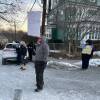After months of protests outside Boston Mayor Michelle Wu’s Roslindale home, the city will place new limits on demonstrations at private residences.
On Wednesday, the Boston City Council approved an ordinance Wu filed in late February that will limit such protests to between 9 a.m. and 9 p.m. Violators will be issued escalating fines, with penalties starting at $50 for a first offense and rising to $300 for a third and subsequent violations. Twelve months after a first offense, that fine schedule would then reset for offenders.
For most of the year, the protests at Wu’s home have been driven by opponents of her requirement that city employees get vaccinated against COVID-19 unless they receive a medical or religious exemption. Recently, though, Wu tweeted that some North End restaurant owners opposed to her policies on outdoor dining in that neighborhood have joined the fray.
Let’s be clear. We will not normalize harassment as acceptable behavior. When members of this group have taken part in the yelling outside my house, bullied City staff & fellow restaurant owners—there is no right to get inside & shout down a press conference too. https://t.co/cOc9vDNx9f
— Michelle Wu 吳弭 (@wutrain) March 29, 2022
Nine councilors voted in favor of the ordinance. Four voted against, including progressive Councilors Julia Mejia and Kendra Lara, who previously warned that the ordinance could detrimentally affect marginalized communities, and Frank Baker and Erin Murphy, two of the council's more conservative members.
Baker spoke at length before the vote and offered two disparate arguments. He warned that the ordinance could infringe on the protesters’ First Amendment rights — but he also complained that, when he was targeted by harassing behavior in the spring and summer of 2020, no one acted to ease his plight.
“I wish this body came around me when this was happening to me,” Baker said. “There weren’t people out in front of my house, but they were crawling all around my house all hours of the evening. They were calling my phone, calling me a scumbag, landlord scumbag, they were harassing my wife on her phone. Fireworks being shot at my house.”
After expressing sympathy for Baker, District Councilor Kenzie Bok suggested his experiences actually helped make the case for the new ordinance.
“We’ve got a consistent pattern here in which folks are crossing this threshold,” Bok said. “And it’s a real problem for a lot of our neighbors. … It feels as though this last couple of years has been characterized by a lot of activity of this type.”
District Councilor Ricardo Arroyo echoed that argument, noting that protesters upset with him recently gathered at his mother’s house.
“When they were informed that it was my mother’s home, they remained, and they continued to harass my mother at her home,” Arroyo said.
“This doesn’t even stop them from doing that,” he added. “From 9 a.m. to 9 p.m., if they wanted to, they could still go to any home in the city and do what they’ve been doing. It doesn’t actually stop that. It just gives folks some grace … to allow them to get ready, start their day, put kids on school buses.”
None of these arguments convinced Baker, however. When he spoke again, he insisted that the ordinance is, in fact, a narrow response to Wu’s needs. He also injected a rare dose of partisan acrimony into the council’s proceedings, accusing “the Left” of accepting violence during the protests that followed the 2020 murder of George Floyd by Minneapolis police officer Derek Chauvin.
“The city was on fire,” Baker said. “We didn’t arrest anybody. I think we arrested the one kid that burnt the police car. … It was the Left that brought this all here.
“We’re looking to change the rules here now because the Left is in charge,” Baker added. ”So there you go — tool of the Left, and now it doesn’t work for them, so let’s change the rules.”
After Baker spoke, Lara noted that 53 people were arrested during the protests he referenced.
Until now, protests at Wu’s home and elsewhere have been constrained by Boston’s existing noise regulations, which prohibit noise levels over 50 decibels between 11 p.m. and 7 a.m., and over 70 decibels at any time except for permitted construction. Those regulations remain in effect, although Arroyo said Wednesday that it’s not clear if the Boston Police Department is actually enforcing them.
Wu still needs to sign the ordinance for it to take effect. After Wednesday's vote, a mayoral spokesperson said she plans to sign it, though it was not immediately clear when.







